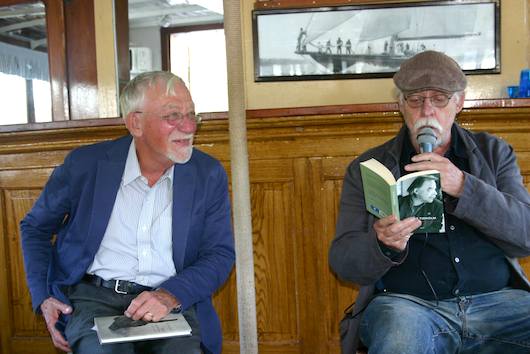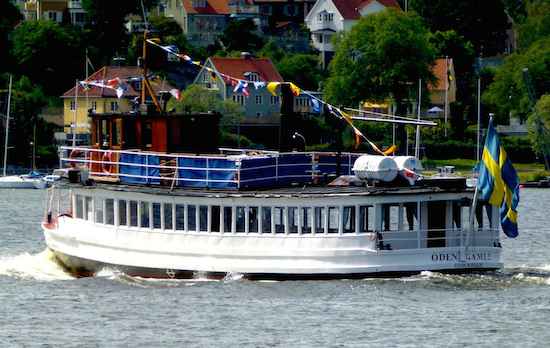September and October are the months for literary events in Sweden, and this year I started my literary adventures with the Södermalms Poetry Festival, which partly took place on an old steamboat cruising through Stockholm’s archipelago, the Skärgården.
Festival director Boel Schenlaer is a well-known poet herself; she often attends national and international festivals, and the Södermalms Poetry Festival is her baby. Running for the 12th year in a row, the festival is three days long. Poets from countries including Israel, Egypt, USA, Syria, and Norway (thirteen nationalities in total) were all invited. As we boated through a dark blue surface shimmering with sunlight, Boel started the poetry cruise, offering everyone a buffet for lunch.
As we ate, Boel told me that her motivation with the festival was to build a bridge between Swedish and international poets.
“My goal is to make the festival even more international in the future. Considering that Sweden is a small country, I believe it is very important for us to have these kinds of interactions with poets from other parts of the world. In this way we can discover new voices and also learn about new cultures,” she said.
The international poets read in their mother tongues; words in Arabic, Hebrew, and Spanish filled the boat as a small audience let their wine glasses rest, and discussions ended and turned to the poet taking the seat in front of the boat. Each reading started in the poet’s native language and was followed up by a Swedish translation and occasionally also one in English. This meant that often the non-Swedish audience was left to make their own interpretations based on body language and tone of voice. Every blink, twitch, or raise of voice became a tool as the listener tried to decipher the meaning of the words that belonged to the foreign language. There was no particular theme to the poems presented, but the poets dished their own specialities, cooked after their secret recipes and garnished with herbs grown in their backyards.

Sudanese-born poet Tarek Eltayeb’s poems about remaining true to yourself in foreign surroundings caused spontaneous nods from the international crowd. Diti Ronen’s poem Little Bird, about her mother’s life inside the Nazi concentration camps, reminded us all of how fragile life can be and how we are all in one way or another connected with each other. The Swedish poet Thomas Tidholm invited laughter as he exposed human greed and questioned politicians through his satirical approach.
The intimacy of the space and the mix of poets from different countries and backgrounds gave this festival a special touch, as it invited both compassion and empathy. It became a platform for idea exchanges between people who might have never met otherwise and made me wish that we were all poets—living in a world of ceasefire, where battles were only fought through words.
Two weeks later, I got on a train and made my way to the Gothenburg Book Fair. This is an annual event that has been held since 1985 and was primarily a trade fair for librarians and teachers, but is now the biggest literary festival in Scandinavia. In an ocean of publisher booths, seminar stages, and national and international author talks, I walked with a nasty cold, scaring anyone who happened to come too close with my Rudolf-red nose and chain-smoking-for-the-past-twenty-years cough.
This year, the Book Fair had a Brazilian focus, and writers such as Rogéria Gomes, Alice Sant’Anna, and Sergio Saboya were a few of those invited. The second theme was “Voices from Catalonia,” and in seven seminars Catalonian literature was presented. Writers such as Núria Amat, Albert Sánchez Piñol, and Jaume Cabré spoke of their fascination with the city of Barcelona and how that has affected their writing.
The fair also offered a talk with Desmond Tutu and his daughter, where they spoke of their new book and the art of forgiveness. There are many things to highlight about the Gothenburg Book Fair, and personally I felt a little extra proud as I saw one of the books I translated (Zan, by the Swedish UN Women Ambassador Arghavan Agida) being showcased on the international stage. However, for me the fair ended sooner than I would’ve liked, as my cold forced me back to bed. Disappointed about missing a good deal of the fair, I returned to Stockholm, but I was not completely heartbroken as I knew Stockholm’s International Literary Festival was not far away!
Sweden may be a small country, but there is a big love here for global literature, and September and October are just the times to experience that love.
***
Jasmine Heydari was born in Iran and moved to Sweden at the age of six. She has a diverse academic background from three different countries, and holds an an MA in creative writing and a BA in drama from Kingston University in London, a diploma in language studies (Mandarin) from Ren Min University in Beijing, and she has studied pedagogy and psychology at Stockholm University. She is a freelance translator and writer.
Images by Bengt Björklund.
Read more:

